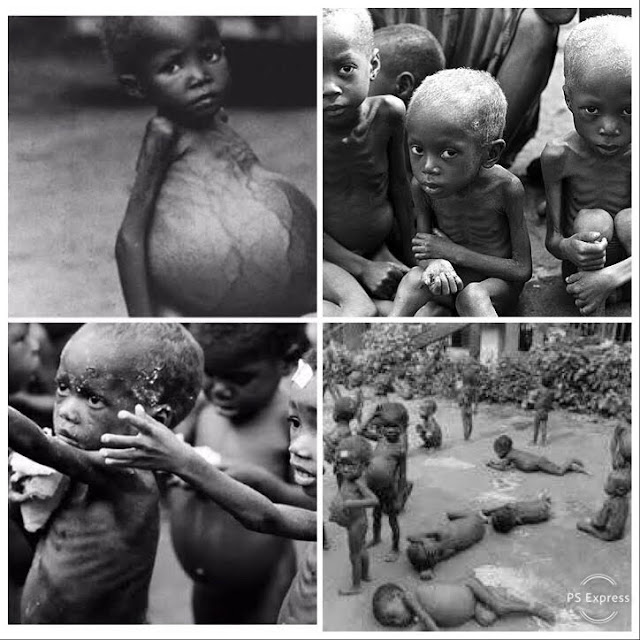The Nigeria genocide against Biafrans between 1967-1970 was erroneously referred to as Nigeria Civil War by the entire world. This wrong des...
The Nigeria genocide against Biafrans between 1967-1970 was erroneously referred to as Nigeria Civil War by the entire world. This wrong description of the genocide that claimed over six million lives, with the majority of this number being children, is evidence of how the Western world strives to suppress Truth and attempts made by any indigenous people of Africa to attain Freedom.
Nigeria became an independent State on October 1st, 1960. Abubakar Tafawa Balewa was its Prime Minister, while Dr. Nnamdi Azikiwe became the Governor General, a ceremonial position reporting to the Queen of England.
Following a UN-supervised referendum in 1961, the Northern part of Cameroon joined Nigeria's Northern region. Southern Cameroon united with Northern Cameroon to form the Federal Republic of Cameroon. On October 1st, 1963, Nigeria became a Republic with Nnamdi Azikiwe as her president, although a ceremonial President, while Sir Abubakar Tafawa Balewa was the first Prime Minister, an office he held from (1960-1966). Tafawa Balewa was more politically powerful as a Prime Minister.
Regional conflicts, ethnic competition, Educational inequality, and economic imbalance led to a controversial census in 1962-63. Nigeria's mid-West region was created in 1963 by dividing the western region. Apart from this division, the country still has three large geographical regions, each controlled by an ethnic group. The Yorubas control the West, the Igbos control the East, and the Hausa control the North. At this time, the presence of Fulani was insignificant; they were never mentioned.
Conflicts never ended, even with autonomy granted to regions.
The South complained of Northern domination, and the North feared the educated Southern elites were bent on taking power. In the West, the government had fallen apart in 1962, and a BOYCOTT of the federal election of December 1964 nearly brought Nigeria to the brink of breakdown. Ethnic conflict led to the killing of hundreds of Igbos who lived in the North.
The turning point occurred in January 1966, when order in Nigeria collapsed following the fraudulent election of October 1965. A group of Army officers attempted to overthrow the federal government, resulting in the assassination of Prime Minister Abubakar Tafawa Balewa and two regional premiers. Major General Johnson Aguiyi Ironsi then established a military administration and planned to abolish the regional system in favor of a unitary government. This led to riots in the North, which tragically resulted in the deaths of many innocent Igbos living there, with an estimated one million Igbos killed in 1966.
The military intervention worsened the political situation as the army began to split along ethnic lines. Northern officers started killing their fellow officers who were not from the North, and many Igbo officers were killed in the West and various parts of the North. The leaders of the January coup were accused of favoring the Igbos. In July 1966, Northern officers staged what they called a counter-coup, resulting in the assassination of Aguiyi Ironsi. Lieutenant Colonel Yakubu Gowon then came to power. The killings of Igbo military officers and civilians in the North fueled crisis and threats of secession coming from the East.
Gowon's attempt to hold a conference to determine Nigeria's constitutional future was abandoned after a series of ethnic massacres, and every subsequent effort to restructure the country has failed. The last serious attempt to prevent Nigeria's collapse came in January 1967, when then-Lieutenant Colonel Odumegwu Ojukwu led the Eastern delegation to meet Nigerian representatives on neutral ground in Aburi, Ghana.
Initially, the atmosphere seemed promising, with pleasantries exchanged between Ojukwu and Gowon. However, foreign interference soon derailed the agreement. Nigerian leaders were misled into rejecting the Aburi Accord. This decision ultimately led Ojukwu to declare the Republic of Biafra from Southeast Nigeria. In response, Nigeria launched a war against Biafra in July 1967. Within weeks, the conflict turned bloody, with Igbo civilians fleeing to the East, only to be ambushed and massacred—especially in Benue and other regions of the Middle Belt.
For three years, Nigeria, with the support of Britain, Russia and other foreign powers, committed genocide in the entire South East region. By the end of the genocide in early 1970, records show that approximately six million people had been killed. This number included but was not limited to children, women, and people of all ages.
The leader of the Indigenous People of Biafra, Mazi Nnamdi Kanu, declared every 30th day of May as a public holiday, a day set aside for the remembrance of all those who lost their lives during that period. A day set aside to pay tributes to the fallen heroes and Heroines. Those who sacrificed their lives to defend the young sovereign state of Biafra. May 30th this year has been declared a "SIT AT HOME" day. It is a complete lockdown. This is also a protest against the criminal silence of Nigeria and the entire world to date.
Written by
Fafa Maintain
Edited by
Oby M
For: States Media Team













No comments